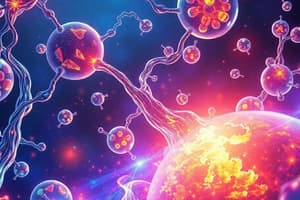Podcast
Questions and Answers
What must happen before a chemical reaction can begin?
What must happen before a chemical reaction can begin?
- The concentration of reactant molecules must be reduced.
- The concentrations of products and reactants must be equal.
- The activation energy must be exceeded. (correct)
- The activation energy must be reached. (correct)
Lactase and carbonic anhydrase are examples of what type of substance?
Lactase and carbonic anhydrase are examples of what type of substance?
- Enzyme (correct)
- Product
- Reactant
- Substrate
Which statement best describes the amount of catalyst that remains at the end of a reaction?
Which statement best describes the amount of catalyst that remains at the end of a reaction?
- The catalyst is consumed by the reaction, so none remains at the end of the reaction.
- The amount of catalyst is the same at the end as at the beginning of the reaction. (correct)
- Less catalyst is present at the end than at the beginning of the reaction.
- More catalyst is present at the end than at the beginning of the reaction.
Which statement best describes how a catalyst can speed up a chemical reaction?
Which statement best describes how a catalyst can speed up a chemical reaction?
In a liquid volcano demonstration, what would be the catalyst?
In a liquid volcano demonstration, what would be the catalyst?
What do you call a substance that influences the reaction but does not participate in the reaction?
What do you call a substance that influences the reaction but does not participate in the reaction?
What method would best answer the researcher's question about reaction rate and the effect of substance A?
What method would best answer the researcher's question about reaction rate and the effect of substance A?
Which two substances bind using a lock-and-key mechanism?
Which two substances bind using a lock-and-key mechanism?
Photosynthesis is an example of:
Photosynthesis is an example of:
How does a catalyst work?
How does a catalyst work?
Flashcards are hidden until you start studying
Study Notes
Key Concepts of Catalysts
- Activation energy must be exceeded for a chemical reaction to commence.
- Catalysts, like lactase and carbonic anhydrase, are specialized substances known as enzymes, which facilitate chemical reactions without being consumed.
Catalyst Presence
- The amount of catalyst remains unchanged after a reaction, indicating it is not consumed in the process.
Mechanisms of Catalysis
- Catalysts accelerate reactions by lowering the activation energy required, making reactions occur faster.
- Catalysts do not alter the concentrations of products or reactants directly; instead, they provide an alternative reaction pathway.
Practical Example
- In a liquid volcano experiment, candy tablets act as a catalyst that initiates a vigorous reaction when added to a carbonated drink.
Definition of a Catalyst
- A catalyst is a substance that influences but does not participate directly in the chemical reaction.
Experimental Design
- To assess the impact of a substance (A) on the reaction rate between two liquids (X and Y), the best approach is to measure the time taken for the reaction to produce a clear liquid both with and without the presence of substance A.
Lock-and-Key Mechanism
- This mechanism describes how enzymes bind specifically to substrates to facilitate reactions.
Photosynthesis
- Photosynthesis is classified as an endothermic reaction, where energy is absorbed rather than released.
Functionality of Catalysts
- Catalysts operate by decreasing the activation energy necessary for a reaction to proceed, thereby enhancing the reaction rate.
Studying That Suits You
Use AI to generate personalized quizzes and flashcards to suit your learning preferences.




